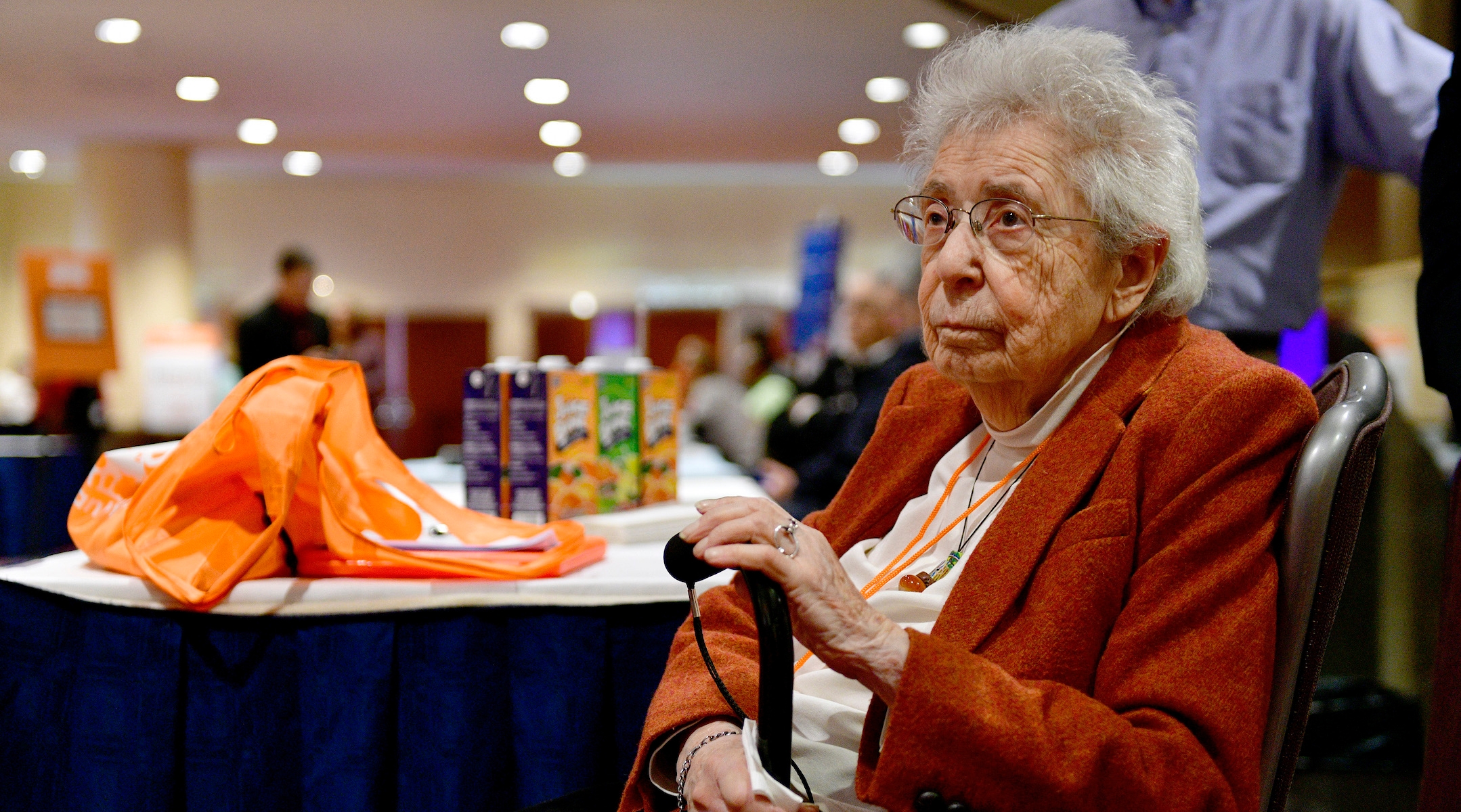Kathy Goldman, NYC’s ‘most important food activist,’ dies at 92
She founded the Community Food Resource Center in 1980 — which provided food to hundreds of thousands of low-income New York City residents — and was its executive director for its 23 years of existence

Kathy Goldman, founder of Food Bank for New York City, attends the organization’s 29th Annual Conference on Hunger and Poverty at Marriott Marquis Times Square, Feb. 13, 2020. (Eugene Gologursky/Getty Images for Food Bank for New York City)
(New York Jewish Week) — A historian once called Kathy Goldman “twentieth-century New York’s most important food activist.”
Born to Jewish immigrant parents in the Bronx, Goldman was a “red-diaper baby” who became one of only two white people to join United Bronx Parents, an effort to reform and change the Bronx public schools in the mid-1960s.
Inspired by the success of UBP’s local meals program, she founded, in 1980, the Community Food Resource Center —which provided food to hundreds of thousands of low-income New York City residents — and was its executive director for its 23 years of existence. She also organized what is now the Food Bank for New York City and started the Community Kitchen of West Harlem, programs that offer food and help in securing housing and health care.
In 2009, she and Agnes Molnar founded Community Food Advocates, lobbying for universal school lunch and other government policies to meet the nutritional needs of Americans.
Goldman died on March 5 in Brooklyn. She was 92.
“She was the single most important voice fighting hunger in New York for 50 years and the first to focus on food in schools, which resulted in literally thousands of kids actually eating the food as opposed to throwing it out,” Fran Barrett, Gov. Kathy Hochul’s interagency coordinator for nonprofit organizations, told the New York Times in an email.
Catherine Vera Friedman was born on Jan. 15, 1932. Her mother, Ila (Goldman) Friedman, immigrated from Hungary and founded a Hungarian women’s magazine. Her father, Samuel, an immigrant from Poland, was a cabinet maker and secretary-treasurer of his union.
“It was a time when people lived in neighborhoods that they gave a damn about, with people that they gave a damn about,” Goldman told an interviewer in 2018. “Both my mother and father were big influences and activists in our community.”
Another influence was a family and historic tragedy: According to her daughter Julie Goldman, most of the family relatives who remained in Europe after her parents immigrated were killed in the Holocaust.
“’I was really raised to believe that if more people had said something, then the Holocaust would not have happened,’” Julie Goldman, quoting her mother, told the New York Times. “’If there would have been a fight back, it would have been mitigated. I believe that ’til this day. You can do something. You can make a difference, you can make a change.’”
Goldman was among the first group of girls admitted to the Bronx High School of Science, and later studied at New York University, City College and Hunter College. In 1986, she earned a master’s degree in urban studies from Queens College of the City University of New York.
Goldman said her life of activism was kicked off when she was raising her own children in the Bronx and she joined United Bronx Parents. A group of Puerto Rican parents complained that the school lunches their children depended on were inedible. To make their point, the UBP invited members of the Board of Education to discuss their grievances — over lunch at one of the schools.
“It was hilarious. One of them actually ended up getting sick from whatever he ate,” she recalled.
The food improved somewhat, although when the Board of Education offered the group no help in setting up a more ambitious nutrition program, Goldman and her fellow parents did it themselves, renting out a space and talking with local grocers and restaurants, eventually creating a Summer Meals Program.
“It was always those accomplishments that felt the best: the times when the community rallied together and did what the government wouldn’t,” Goldman said in the 2018 interview. “I still struggle, though, with the kind of work that groups like ours do. It is good work, necessary work, because it needs to get done each day to keep people alive and well. However, it is the government’s responsibility and it falls on individuals to right the injustices that they are faced with. Finding a balance between doing what must get done for the group’s survival and demanding that the government do its job is the hard part.”
She is survived by her daughter; her sons, Joseph and Robert Goldman; five grandsons, and two great-grandsons. Her marriage to Jack Goldman ended in 1974.
This article originally appeared on JTA.org.














